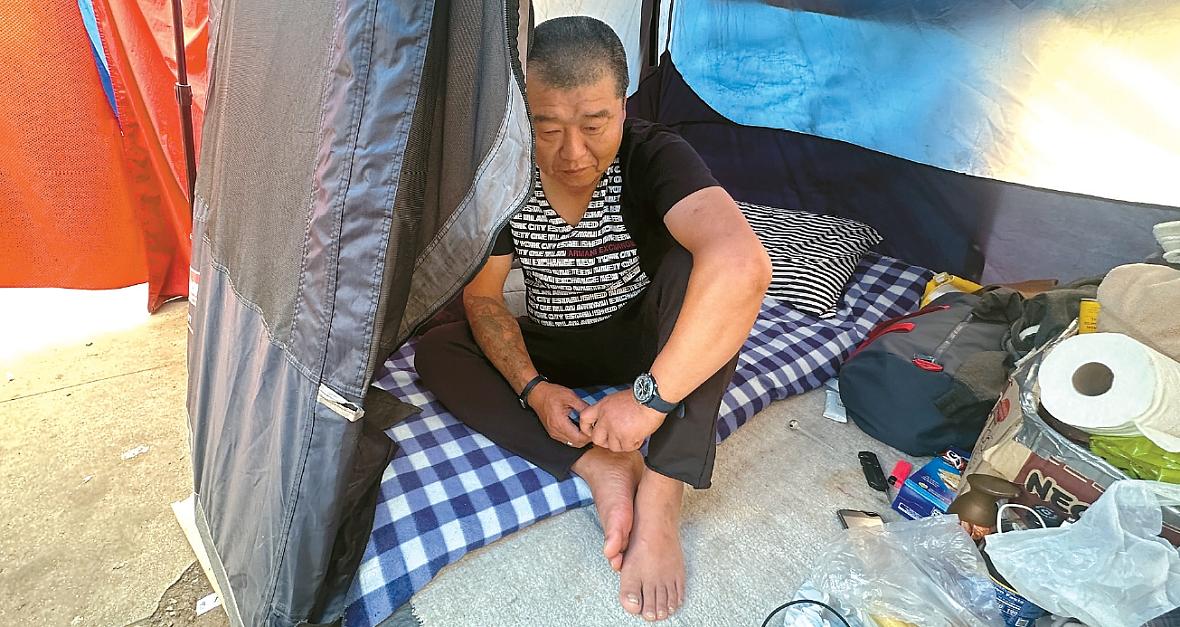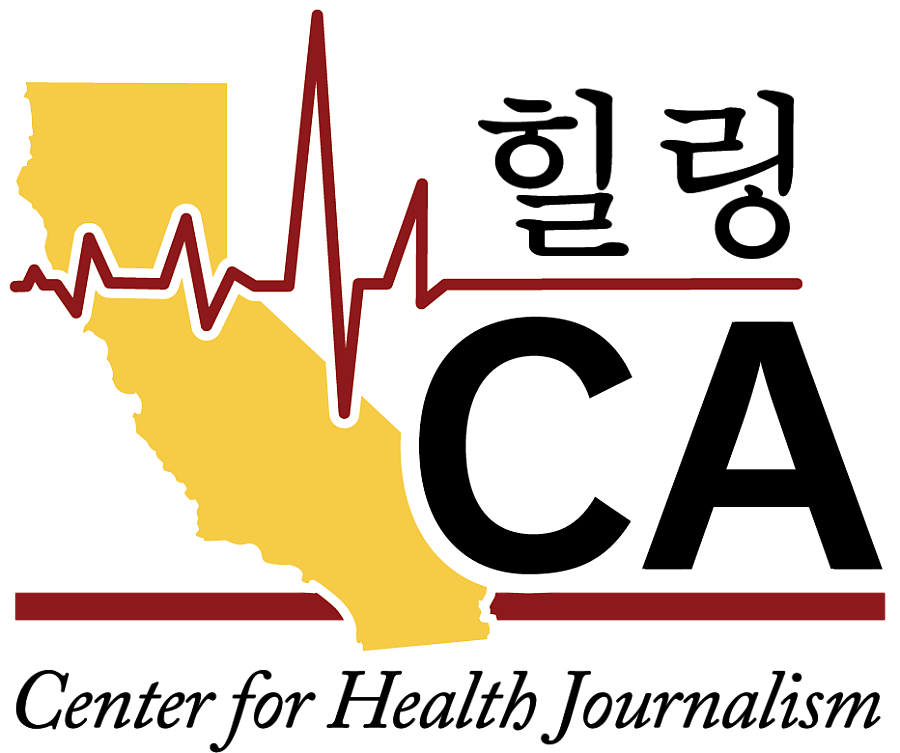Voluntary Homeless Shelters Struggle to Stay Open Without City License Amid Growing Crisis
The story was co-published with Korea Daily as part of the 2024 Ethnic Media Collaborative, Healing California.

Jun Park has been living in a tent on the Olympic Boulevard in Los Angeles Koreatown for nearly a year.
Sangjin Kim, The Korea Daily

Despite the growing number of homeless Korean Americans in the last few years, there is a gap in the resources available to support and safeguard this population. Language barriers hinder access to mainstream shelters, while Korean American organizations face challenges in functioning due to government authorization, resulting in a lack of financial assistance to help them operate.
Recent assessments by Korea Daily have identified the Korean homeless population in the LA area to be around 55 individuals. Confirmed recent sightings include approximately 15 individuals in two tent encampments in Los Angeles Koreatown, 20 at Father Yohan Kim’s homeless shelter, and about 20 at Pastor Moody Ko’s Father's Table Mission Los Angeles shelter and the Victorville Healing Center.
This is a phenomenon that was unforeseen eight years ago when the emergence of homeless camps in Koreatown was first reported. Thirty-three homeless tents or tarps were counted in the neighborhood, but no Korean American homeless people were found at that time.
Fast forward to May 2024, the landscape has shifted. Korean homeless tent communities have sprouted in at least two locations in Koreatown. Unhoused Koreans are now visible sitting with blankets and belongings in front of Korean markets, churches, and other businesses. Economic and social vulnerabilities, aggravated by the pandemic, have dismantled support systems, pushing economically and socially vulnerable Koreans onto the streets.
The majority of the Korean-American homeless individuals interviewed by the Korea Daily were not aware of the city’s homeless policy (Inside Safe LA), which provides temporary housing in motels and hotels. Many of them are either undocumented or do not speak English. Despite Los Angeles spending 10% of its budget ($1.3 billion) in 2023 on homeless initiatives, Korean homeless individuals are still in the "blind spot of interest," relying on private assistance.
According to a 2023 study on the causes of death among APIs who died while homeless in Santa Clara County, Asians and Pacific Islanders (APIs) are “invisible and unacknowledged” in community public discourse and policy making due to their minority status.
On April 11th and 21st, two Korean men (aged 34 and 65) were found dead in separate incidents at the two tent communities in LA Koreatown, shocking the Korean community.
The report found that out of the 1,394 homeless deaths in Santa Clara County between 2011 and 2021, Asians and Pacific Islanders accounted for 87 deaths, or 6.2 percent. The leading causes of death for Asian American homeless individuals were injury and illness, which accounted for approximately 70% of the deaths, in contrast to the leading causes of death for other races, which were drugs and alcohol.
Korean homeless individuals avoid using general homeless shelters in LA, citing fears of violence, unhygienic conditions, and a sense of isolation from fellow Asians. Instead, they prefer to reside in tent communities, private shelters, and healing centers run by Koreans.
Park Dong-gu (56), who has been homeless for 15 years, has been staying at Father's Table Mission shelter for the past year. He shared his reluctance to go to nearby homeless shelters, saying, "When Asians, who are rarely seen among the Black, White, and Latino homeless individuals at the shelter come in, people think they might have something valuable to steal and attack them. I almost died. Since then, I don't go at all."
Korean private shelters are positioned precariously between legality and illegality. A few shelters lack licenses, like Board and Care license, due to lack of manpower and finances. The situation relies on charitable donations from Good Samaritan Koreans and have few volunteer resources.
LA city officials prioritize regulations over efforts to support Korean-American homeless shelters. “Korean-American organizations that run homeless shelters generally operate in poor conditions and often violate government regulations, which is why they cannot receive government support,” explained a Korean-American city government employee who requested anonymity.
“Even if I wanted to ask the mayor or city council for help, I don’t know how to approach them. There is no specialized staff,” said Pastor Moody Ko from Father’s Table Mission.
In response to inquiries about how to support Korean-American-run shelters, Los Angeles Mayor Karen Bass’ office said, “We are committed to overcoming this challenge by prioritizing the development of Korean-language resources and strengthening our collaboration with Korean-American organizations.”
Councilmember Heather Hutt’s office of District 10, which encompasses Koreatown, said, “If you need assistance with homelessness, you can contact a representative by phone at 213-473-7010 and by email at roger.estrada@lacity.org.”
These Korean shelters operate in 'stealth mode' out of concern for being exposed in the surrounding area. They teeter on the edge of legality, grappling with licensing gaps and financial constraints. If neighbors raise complaints to the LA City, Korean people seeking support in these shelters may face the risk of being pushed back onto the streets.
Yohan Kim's House of Sharing shelter has had to move three times. Pastor Moody's Father's Table shelter is in an unstable situation where the rental contract is renewed every month.
In February 2014, the Los Angeles City Attorney’s Office filed civil charges against the operator of Agape Home Mission, Pastor Kangwon Lee, for operating without a license and violating basic rights. Since 2000, Lee had provided housing for Korean-American homeless individuals and those struggling with drug and alcohol addiction. As a result of the charges, he was stripped of his license to operate the facility. Now, Lee himself is also homeless, living in a tent in Koreatown.
Amidst these challenges, the contradictions between Korean homeless individuals receiving essential provisions at Korean free shelters and LA city’s regulatory approach without sufficient support highlights a troubling reality of neglect and misalignment.
This project is supported by the USC Annenberg Center for Health Journalism, and is part of “Healing California,” a yearlong reporting Ethnic Media Collaborative venture with print, online and broadcast outlets across California.
